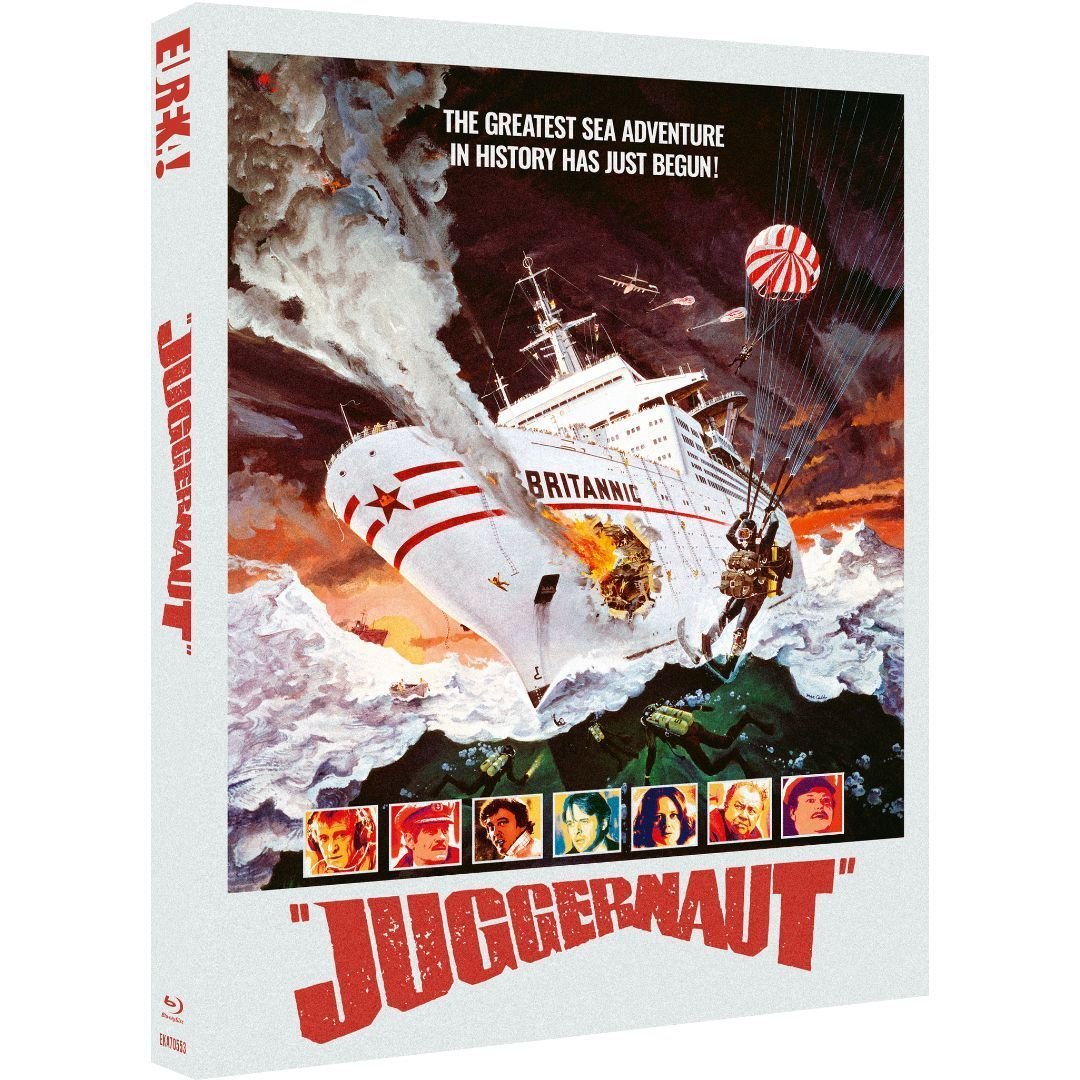Juggernaut │ Eureka Entertainment
by JAMES CAMERON-WILSON
Perhaps surprisingly, Juggernaut is being released on Blu-ray for the first time in the United Kingdom, from a high-definition restoration, to celebrate its fiftieth anniversary. When Juggernaut was first released in cinemas in 1974, it was at the height of the disaster movie era, following on from The Poseidon Adventure (1972) and, in the same year, Airport 1975, Earthquake and The Towering Inferno, all stories featuring numerous sundry characters trapped together in terrifying circumstances. However, Juggernaut was a very different thing, both in its execution and in its presentation. Loosely inspired by the bomb hoax on board the QE2 luxury liner in 1972, the film was originally to have been directed by Bryan Forbes. However, when Forbes jumped ship, he was replaced by the American TV director Don Medford, who also left the project at the last minute, leaving the production company with the enormous daily expense of hiring the Russian passenger ship the TS Maksim Gorkiy – without a captain at the helm. At the time, the Maksim Gorkiy was the Soviet Union’s most luxurious passenger ship in service and did not come cheap. In desperation, the producer Denis O'Dell turned to his old mate Richard Lester, who was putting the finishing touches to The Four Musketeers in Spain. But Lester had only three weeks until the start of production of Juggernaut, yet he took on the challenge, hiring Alan Plater to completely rewrite the script and produce new dialogue (the latter drawing on his experience turning out quick-fire scripts for Z Cars on TV). There was to be a ten-week shoot, but thanks to Lester’s rapid directorial style the film was completed in six weeks, with four weeks to spare. The director also gathered around him a number of his favourite actors at the last minute to add to the already cast Richard Harris, Omar Sharif and David Hemmings.
Besides its miraculous production history, Juggernaut was also using 200 film extras on board the actual Maksim Gorkiy and broke all sorts of maritime rules by detonating explosions on board and knowingly steering the sheep into a force eight gale, locating the fiercest weather in the North Sea and North Atlantic by radar. All the other scenes, in makeshift Whitehall accommodation and various administrative offices, were shot on location. So, unlike The Poseidon Adventure and Titanic, say, which were filmed in studio tanks, this was the real thing, shot in very real, very rough seas under both a figurative and literal ticking clock.
Juggernaut is actually the codeword a bomber uses to inform the government of his (or her) plans to blow up a luxury liner and its 1,200 passengers unless they cough up £500,000. Richard Lester had expressed dissatisfaction with the name of the film, and the title has been blamed for the movie’s underperformance at the box-office, which was changed to Terror on the Britannic for its DVD release in Britain, making it sound like a hokey 1970s B-movie.
Looking at it again today, like so many critics who have reassessed the film, I feel it not only stands up incredibly well, but, per the words of Time Out magazine, is “a masterclass in popular entertainment.” But I think it’s even better than that, as both a very smart thriller and as a political allegory of what Britain was going through at the time, suffering at the hands of the IRA bombing campaign on the mainland. Besides all the visual humour that Richard Lester brings to the table, there is a virtuoso use of dramatic counterpoint, building the suspense exponentially, prompting the legendary American critic Pauline Kael to say that it was by far the best of all the disaster films. This is the British stiff upper lip approach to impending catastrophe, while Richard Harris as the sardonic bomb disposal expert Anthony Fallon, gives one of his more controlled, charismatic performances, whose life-saving expertise is akin to that of a neurosurgeon.
It's also a beautifully edited and structured film, in which as the story progresses and events become a race against time, the escalating action becomes an ever more intimate thing, played out on the face of Richard Harris as he concentrates on the hidden booby traps littered around the SS Britannic. There is also excellent support from a host of British acting royalty, all of whom are at the top of their game, including Sir Anthony Hopkins, Sir Ian Holm, Sir Michael Hordern and Freddie Jones and, in a chilling cameo, Cyril Cusack, echoing the character he played in Michael Powell’s The Small Back Room (1949). But then practically every face in the crowd is well known, including a fleeting cameo from Sean Mathias as a fancy dress pierrot, years before he become the romantic and business partner of Ian McKellen. As usual with the Eureka Classics range, there is a superlative audio commentary, along with two engaging on-camera essays from the film historians Sheldon Hall and Neil Sinyard.
Eureka Entertainment’s release of Juggernaut is now available on Blu-ray
EUREKA ENTERTAINMENT is the leading independent distributor of classic silent/early films in the UK. In 2004, Eureka! established the award winning Masters of Cinema Series, a specially curated director-led Blu-ray and DVD collection of classic and world cinema using the finest available materials for home viewing. In 2014, Eureka! established Eureka! Classics intended to highlight a broader selection of classic and cult cinema, and in 2017, Eureka! established Montage Pictures, a label celebrating ground-breaking and thought-provoking world cinema from new and upcoming directors.
